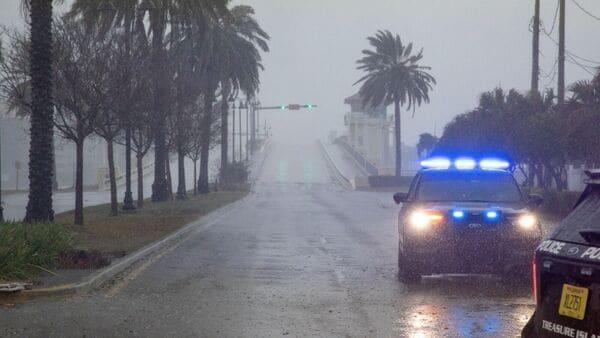
Hurricane Oscar: Blackout In Cuba, Cuban Government Blames Lack Of Foreign Currency Top 7 Highlights On What Happened
Though power has been restored to parts of the capital, Havana, large swathes remain without electricity. The outage's effects extend beyond lighting-water supply systems that rely on electric pumps have also been affected, leaving many residents scrambling for alternatives.
Here are the key developments from the crisis1. What caused the blackout?The Antonio Guiteras thermoelectric plant, located in Matanzas Province east of Havana, suffered a critical failure late Thursday. By Friday morning, the entire island was in the dark. Even in a country accustomed to frequent outages, this collapse was unprecedented outside of events caused by powerful hurricanes, such as Ian in 2022.
The crisis was exacerbated by increased energy demand from households and businesses, many of which installed air conditioners this year. Authorities also cited ageing thermoelectric plants, insufficient fuel supplies, and limited maintenance resources due to US sanctions as contributing factors.
Also Read | Crises at Boeing and Intel are a national emergency 2. Economic impact, resource strainThe Cuban government has blamed a lack of foreign currency and fuel shortages for the deteriorating condition of its power plants. The country produces only half of the oil it needs and relies on international allies, such as Venezuela and Russia, to supply the rest. However, due to sanctions, these imports have become increasingly difficult and costly.
Officials implemented emergency measures, suspending classes and closing non-essential workplaces to curb electricity demand.
3. Cooking on the streets, spoiled foodWith no electricity to power refrigerators, many residents turned to cooking food before it spoiled. Improvised wood stoves were seen on the streets, as people used any available resources to prepare meals.
The power outage also disrupted water supply services, leaving many without running water as pumps stopped functioning.
4. Political fallout, protests looming?Prolonged power outages have previously triggered protests, and authorities remain on edge about potential unrest. Demonstrations erupted in July 2021 over blackouts and shortages, drawing global attention to the government's heavy-handed response. Smaller protests followed in October 2022 and March of this year.
Also Read | China cuts benchmark loan prime rates by 25 bps; one-year LPR stands at 3.10%While officials haven't confirmed whether similar protests are brewing, the government has indicated that it is reviewing electricity rates for businesses-part of the broader economic reforms introduced in 2021.
5. Weather woes add to the crisisCuba faces additional challenges as it braces for Hurricane Oscar, the 10th storm of the 2024 Atlantic season. The National Hurricane Centre issued warnings for the eastern provinces of Guantánamo, Holguín, and Las Tunas, with a dangerous storm surge expected to affect parts of southeastern Cuba and the Bahamas.
6. Restoration efforts underwayCuban authorities announced they are using distributed generation and restarting gas-fired plants to restore power in some areas. However, full restoration will take time as the government grapples with limited resources and ageing infrastructure.
“We are devoting absolute priority to addressing and solving this highly sensitive energy contingency,” President Miguel Díaz-Canel posted on X.“There will be no rest until its restoration,” he added.
7. Future energy plans in the pipelineIn response to ongoing energy challenges, Cuba is working to modernise its electrical grid with alternative energy sources. A project involving the construction of 31 solar power centres is in progress, with completion targeted for next year.
Also Read | Biden surveys Hurricane Milton damage in Florida and Harris attends church in North Carolina The government hopes these initiatives will reduce the country's dependence on oil-based thermoelectric plants and help stabilise the power grid in the long term. Legal Disclaimer:
MENAFN provides the
information “as is” without warranty of any kind. We do not accept
any responsibility or liability for the accuracy, content, images,
videos, licenses, completeness, legality, or reliability of the information
contained in this article. If you have any complaints or copyright
issues related to this article, kindly contact the provider above.


















Comments
No comment